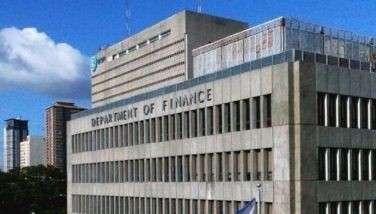A question of priorities

The UK-based Fitch Ratings has expressed strong doubts Ate Glue will be able to limit the budget deficit within P63 billion this year. On the contrary, Fitch sees it is more likely to double to more or less P125 billion. Finance Secretary Teves insists this isn’t so, saying that Fitch didn’t factor proceeds from privatization sales.
Between Teves and Fitch, I am more inclined to take the view of Fitch. I do not see how Teves could be so optimistic about privatization sales in the light of our experience in the recent past. Sure there are big ticket items on the block but it isn’t easy to successfully auction them off. He is also yet to show a detailed privatization plan that would detail what government assets will be sold and for how much.
It is clear that finances would be tight this year, specially in the context of Ate Glue’s SONA last Monday. It would take a magician the caliber of David Copperfield to produce enough money to fund the litany of airports, bridges, highways and ports enumerated by Ate Glue in her SONA, not to mention increased expenditure on education and health which she also promised.
In fact, it would be irresponsible of Ate Glue’s boys not to have started to prioritize expenditures in the light of our fiscal realities. Budget Secretary Andaya is echoing the optimism of Secretary Teves on the matter of being able to have enough money to finance the P1.7 trillion budget for infrastructure in the next three years. Their optimism however, sounds like a typical press release from the Palace.
Then again, as Romy Neri said, they can always borrow. But if they do this, the market knows government’s level of desperation and the cost of borrowing will go up. That should be good news for guys like me who partly depend on interest income from Treasury bills. But it’s not good for the country to continue to pile on what is already our mountain of debts.
Let us also not forget the off budget items imposed on the taxpayers like that National Broadband project. Guys like Neri defend the “affordability” of the project supposedly because
And the worst part about this type of foreign “assistance” project is that payment for it is automatically appropriated… going around the constitutional requirement for Congress to study, debate and pass on the need to spend this much money for this kind of project. Congress is denied the right to prioritize this broadband project in the context of everything else that we must allocate scarce funds in the National Treasury for.
Dr. Raul Fabella, the Dean of the UP
In fact, if you read the minutes of the Palace meetings where the project was discussed, you get the sense that this is also the position and the understanding of Ate Glue. Dean Fabella noted “President Gloria Macapagal-Arroyo’s stated position during the
Unfortunately, Dean Fabella laments, “somewhere along the run-up to the May 2007 elections, this resolve petered out… Sexed up by easy Chinese financing offer for two pipelines, the broadband initiatives shot from nowhere to the top of the list. This is classic supply-driven decision making.” Or is it because the local sponsor of the project was simply irresistible in the context of the May elections?
Anyway, Dean Fabella also noted something I wrote about earlier in this column on why not all foreign assistance projects are worth our consideration. We have a history of ODA projects that benefited the donor country and its suppliers more than us, the intended beneficiaries.
As Dean Fabella observed, “supply- or donor-driven ODA projects have a colorful history of ending up as boondoggles. They have the nasty habit of creating a mountain of debt without the counterpart asset to pay for the debt service. To add to the burden, many of these ODA loans also support projects that are injurious to the private sector.”
Dean Fabella warns “the odds of project failure spike when these projects exhibit this additional feature. William Easterly’s White Man’s Burden (2005) should be a required reading for
In his learned opinion, Dean Fabella thinks “the expanded NBN and CyberEd Project fit the mold of potential white elephants. Easy ODA financing for the unwary is like steroids - you bulk up before you lose your balls.”
More specifically, Dean Fabella points out “the economics of the expanded NBN does not make sense. The
“The existing backbones are currently heavily underutilized. Congestion is furthest from the mind. Emergency slack provision is adequately provided for. Abuse of monopoly position over backbone ownership is not an issue since the market has two, not one, pipelines. The cost-benefit numbers (the ones made public which unfortunately keeps changing as the criticism has mounted) do not add up over the life of the project, this even in the best-case scenario. The worst-case scenario is a $700-million debt-service nightmare.”
So, Dean Fabella raises the spectre of “crony capitalism” resurrecting with this broadband projects. “When the economics of a costly project is either patently flawed or is carefully hidden from public scrutiny, the spectre of “crony capitalism” emerges and enjoys widespread patronage.” Apparently, Ate Glue forgot her earlier understanding of the project as being justified only on a B-O-T basis because the persuasive powers of the project’s proponent was equal to that of Marcos crony capitalists.
In any case, Dean Fabella emphasizes that “not all infrastructure is equal. Some are definitely more equal than others. This is a 200-year-old wisdom we inherited from Adam Smith (The Wealth of Nations, 1776) which proposed substantial “publicness” of the project as the condition for government provision. Infrastructure already adequately provided by the private sector do not have sufficient “publicness” to warrant further state provision. Such obviously are the NBN and CEP backbones.”
Speaking of right priorities, Dean Fabella concedes that for example, “the completion of the Light Rail Transit Loop in Metro Manila beckons. The
Dean Fabella concludes “the economics of the NBN and CEP backbones demand that they be scuttled. They send a signal that the government loses its compass everytime there is some money to burn. It reinforces the sad impression that the
Money for the preacher
From Chito Santos.
After the church service a little boy told the parish priest, “When I grow up, I’m going to give you some money.”
“Well, thank you,” the priest replied, “but why?”
“Because my daddy says you’re one of the poorest preachers we’ve ever had.”
Boo Chanco ‘s e-mail address is [email protected]
- Latest
- Trending




























